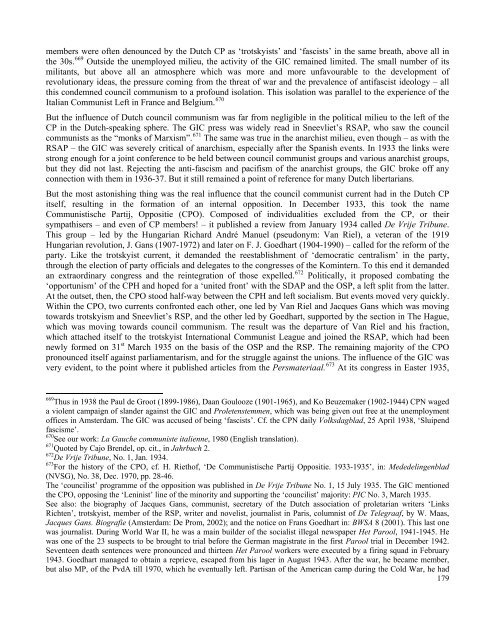The German-Dutch Communist Left - Libcom
The German-Dutch Communist Left - Libcom
The German-Dutch Communist Left - Libcom
You also want an ePaper? Increase the reach of your titles
YUMPU automatically turns print PDFs into web optimized ePapers that Google loves.
members were often denounced by the <strong>Dutch</strong> CP as ‘trotskyists’ and ‘fascists’ in the same breath, above all in<br />
the 30s. 669 Outside the unemployed milieu, the activity of the GIC remained limited. <strong>The</strong> small number of its<br />
militants, but above all an atmosphere which was more and more unfavourable to the development of<br />
revolutionary ideas, the pressure coming from the threat of war and the prevalence of antifascist ideology – all<br />
this condemned council communism to a profound isolation. This isolation was parallel to the experience of the<br />
Italian <strong>Communist</strong> <strong>Left</strong> in France and Belgium. 670<br />
But the influence of <strong>Dutch</strong> council communism was far from negligible in the political milieu to the left of the<br />
CP in the <strong>Dutch</strong>-speaking sphere. <strong>The</strong> GIC press was widely read in Sneevliet’s RSAP, who saw the council<br />
communists as the “monks of Marxism”. 671 <strong>The</strong> same was true in the anarchist milieu, even though – as with the<br />
RSAP – the GIC was severely critical of anarchism, especially after the Spanish events. In 1933 the links were<br />
strong enough for a joint conference to be held between council communist groups and various anarchist groups,<br />
but they did not last. Rejecting the anti-fascism and pacifism of the anarchist groups, the GIC broke off any<br />
connection with them in 1936-37. But it still remained a point of reference for many <strong>Dutch</strong> libertarians.<br />
But the most astonishing thing was the real influence that the council communist current had in the <strong>Dutch</strong> CP<br />
itself, resulting in the formation of an internal opposition. In December 1933, this took the name<br />
<strong>Communist</strong>ische Partij, Oppositie (CPO). Composed of individualities excluded from the CP, or their<br />
sympathisers – and even of CP members! – it published a review from January 1934 called De Vrije Tribune.<br />
This group – led by the Hungarian Richard André Manuel (pseudonym: Van Riel), a veteran of the 1919<br />
Hungarian revolution, J. Gans (1907-1972) and later on F. J. Goedhart (1904-1990) – called for the reform of the<br />
party. Like the trotskyist current, it demanded the reestablishment of ‘democratic centralism’ in the party,<br />
through the election of party officials and delegates to the congresses of the Komintern. To this end it demanded<br />
an extraordinary congress and the reintegration of those expelled. 672 Politically, it proposed combating the<br />
‘opportunism’ of the CPH and hoped for a ‘united front’ with the SDAP and the OSP, a left split from the latter.<br />
At the outset, then, the CPO stood half-way between the CPH and left socialism. But events moved very quickly.<br />
Within the CPO, two currents confronted each other, one led by Van Riel and Jacques Gans which was moving<br />
towards trotskyism and Sneevliet’s RSP, and the other led by Goedhart, supported by the section in <strong>The</strong> Hague,<br />
which was moving towards council communism. <strong>The</strong> result was the departure of Van Riel and his fraction,<br />
which attached itself to the trotskyist International <strong>Communist</strong> League and joined the RSAP, which had been<br />
newly formed on 31 st March 1935 on the basis of the OSP and the RSP. <strong>The</strong> remaining majority of the CPO<br />
pronounced itself against parliamentarism, and for the struggle against the unions. <strong>The</strong> influence of the GIC was<br />
very evident, to the point where it published articles from the Persmateriaal. 673 At its congress in Easter 1935,<br />
669 Thus in 1938 the Paul de Groot (1899-1986), Daan Goulooze (1901-1965), and Ko Beuzemaker (1902-1944) CPN waged<br />
a violent campaign of slander against the GIC and Proletenstemmen, which was being given out free at the unemployment<br />
offices in Amsterdam. <strong>The</strong> GIC was accused of being ‘fascists’. Cf. the CPN daily Volksdagblad, 25 April 1938, ‘Sluipend<br />
fascisme’.<br />
670 See our work: La Gauche communiste italienne, 1980 (English translation).<br />
671 Quoted by Cajo Brendel, op. cit., in Jahrbuch 2.<br />
672 De Vrije Tribune, No. 1, Jan. 1934.<br />
673 For the history of the CPO, cf. H. Riethof, ‘De <strong>Communist</strong>ische Partij Oppositie. 1933-1935’, in: Mededelingenblad<br />
(NVSG), No. 38, Dec. 1970, pp. 28-46.<br />
<strong>The</strong> ‘councilist’ programme of the opposition was published in De Vrije Tribune No. 1, 15 July 1935. <strong>The</strong> GIC mentioned<br />
the CPO, opposing the ‘Leninist’ line of the minority and supporting the ‘councilist’ majority: PIC No. 3, March 1935.<br />
See also: the biography of Jacques Gans, communist, secretary of the <strong>Dutch</strong> association of proletarian writers ‘Links<br />
Richten’, trotskyist, member of the RSP, writer and novelist, journalist in Paris, columnist of De Telegraaf, by W. Maas,<br />
Jacques Gans. Biografie (Amsterdam: De Prom, 2002); and the notice on Frans Goedhart in: BWSA 8 (2001). This last one<br />
was journalist. During World War II, he was a main builder of the socialist illegal newspaper Het Parool, 1941-1945. He<br />
was one of the 23 suspects to be brought to trial before the <strong>German</strong> magistrate in the first Parool trial in December 1942.<br />
Seventeen death sentences were pronounced and thirteen Het Parool workers were executed by a firing squad in February<br />
1943. Goedhart managed to obtain a reprieve, escaped from his lager in August 1943. After the war, he became member,<br />
but also MP, of the PvdA till 1970, which he eventually left. Partisan of the American camp during the Cold War, he had<br />
179
















